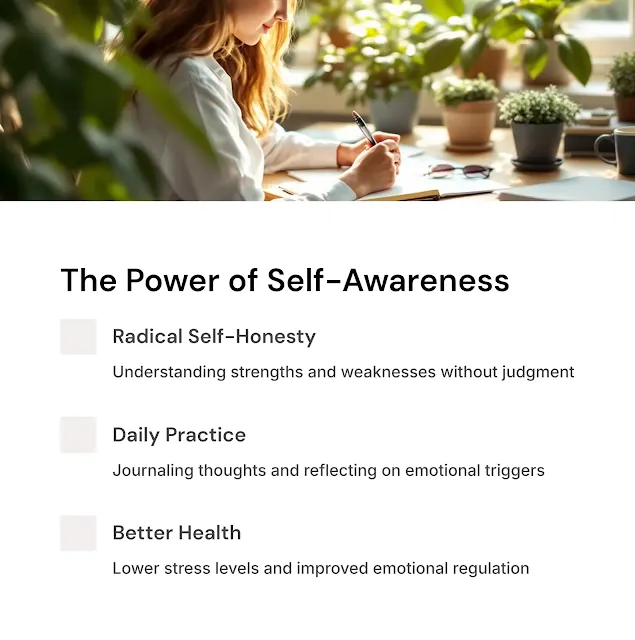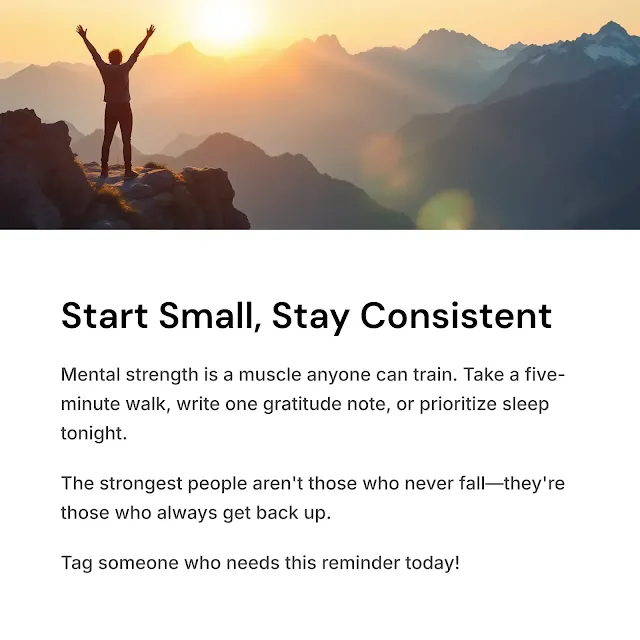Are you truly okay, or just functioning? In today’s fast-paced society, mental health isn’t a luxury—it’s a survival skill. With rising stress from work, academics, relationships, and global instability, our inner resilience gets tested daily. Mental strength isn’t about suppressing emotions; it’s about navigating through chaos with calm clarity. This blog unpacks what mentally strong people do differently—and how you can start building that strength today.
Self-Awareness and Self-Acceptance
One of the most defining traits of mentally strong individuals is their deep self-awareness. They understand their strengths and weaknesses not as labels, but as a spectrum that makes them human. This isn’t just self-knowledge—it’s self-honesty. They don’t shy away from their flaws. Instead, they hold space for them and treat them with the same level of respect as their strengths. As a result, they're not thrown off course by temporary failures or criticism, because their sense of identity isn’t built on perfection but on understanding.
And here’s the thing—self-awareness isn’t something you wake up with one day. It’s a daily practice. People who manage their mental well-being effectively often journal their thoughts, reflect on emotional triggers, and embrace vulnerability. According to studies published by Verywell Mind and Medium, those with high self-acceptance experience lower levels of stress, better emotional regulation, and even improved physical health.
It’s not about liking everything about yourself. It’s about acknowledging your inner landscape—flaws, fears, and all—and not letting them dictate your self-worth. In other words: radical honesty with yourself is the beginning of all mental strength. The more we accept who we are, the less power failure and judgment hold over us.
Emotional Awareness and Regulation
Emotionally intelligent individuals don’t just feel—they name, observe, and manage their feelings with grace. When anxiety strikes or anger flares, they don’t react impulsively. Instead, they pause, breathe, and choose their response. That moment of pause? That’s where their power lies.
According to Corner Canyon Health Center and Verywell Mind, effective emotional regulation correlates with reduced cortisol levels, enhanced problem-solving, and stronger relationships. Techniques like deep breathing, mindfulness, and expressive writing (yes, even that messy vent-in-your-journal style) are tools they use regularly—not just in crises, but preventively.
And here's an important distinction: they don't suppress emotions. They express them—healthily. Whether it's through quiet reflection, talking to someone they trust, or even crying without shame, they let their feelings move through them instead of letting them take over. This level of emotional fluency isn't just helpful—it's life-saving.
Consistent Physical Activity
Let’s not sugarcoat it—your body affects your mind. And those who manage their mental health well know this truth intimately. Regular exercise isn’t just about fitting into jeans or chasing some vague idea of fitness. It’s about mental clarity, emotional stability, and even joy. Studies from Mayo Clinic and PubMed consistently show that aerobic activity like walking, cycling, or swimming boosts mood, reduces anxiety, and significantly lowers the risk of depression.
- 30 minutes of daily exercise can reduce symptoms of depression and anxiety.
- Physical activity improves sleep quality and boosts cognitive function.
- Exercise helps regulate dopamine and serotonin—crucial for emotional balance.
- Movement builds resilience—not just physically, but mentally too.
Bottom line? If you want a stronger mind, train your body. Not for performance. For presence. And consistency beats intensity—every time.
Healthy Lifestyle and Sleep
Mental strength starts with something many people overlook—sleep. Getting quality rest isn’t just about feeling energized. It literally resets your brain, helping with emotional balance, memory consolidation, and stress hormone regulation. When sleep suffers, everything does—your patience, focus, and even your immune system. According to Harvard Health and Better Health Channel, chronic sleep deprivation increases anxiety, weakens cognitive functioning, and accelerates emotional burnout.
Mentally strong people don’t just “try” to sleep better—they design their routines around it. They have sleep hygiene down to a science: avoiding screens before bed, going to bed and waking up at the same time, and creating a calm, dark, quiet environment. These aren’t luxuries. They’re non-negotiables.
And sleep is just one part. These individuals also maintain daily rhythms that promote emotional stability—balanced meals, movement, downtime, boundaries with tech. It’s not about being perfect, but intentional. Good habits reinforce good moods, and your brain knows when you’re taking care of it.
Positive Thinking and Gratitude
It’s not about toxic positivity. Mentally strong people don’t pretend everything is fine when it’s not. But what they do differently is train their brains to search for light even in dark places. They practice reframing—choosing empowering interpretations over defeatist ones—and they cultivate gratitude like it’s a daily workout.
According to studies from Brunch and DailyGood, gratitude practices like journaling three things you’re thankful for each night lower stress levels, improve sleep, and even enhance heart health. These aren’t fluffy habits. They’re neuroscience-backed routines.
Mentally resilient people often keep gratitude journals, reflect on what went right (even on hard days), and thank people out loud. This mindset shift doesn’t remove problems—but it shifts your relationship to them. Instead of reacting with helplessness, you respond with grounded perspective.
Resilience Training and Goal Setting
- They set long-term visions but break them into small, actionable goals.
- They view setbacks not as failures, but as feedback loops.
- They rely on support networks instead of isolating themselves during crises.
- They revise goals when necessary, not because they quit—because they adapt.
Resilience isn’t about never breaking. It’s about becoming bendable enough to not shatter. According to PubMed and Brunch, goal setting increases dopamine production and reinforces a growth mindset. Even more powerful? The act of bouncing back, stronger. Every time life knocks them down, these people rebuild—with more insight and grit.
Mental strength isn’t some rare talent reserved for the lucky few. It’s a muscle—one that anyone can train, nurture, and grow. Maybe today it means taking a five-minute walk, writing a gratitude line before bed, or finally getting that full eight hours of sleep. The important thing? Start small, stay consistent, and keep choosing yourself—even on hard days. Because the strongest people aren’t the ones who never fall, but the ones who always get back up with more clarity, more compassion, and more courage.
Related Resources
- Verywell Mind - Mental Health Tips
- Mayo Clinic - Stress Management
- TEDx Talk - The Power of Resilience
- PubMed Central - Mental Health Research
- Banyan Treatment Center - Mental Health Articles








Post a Comment